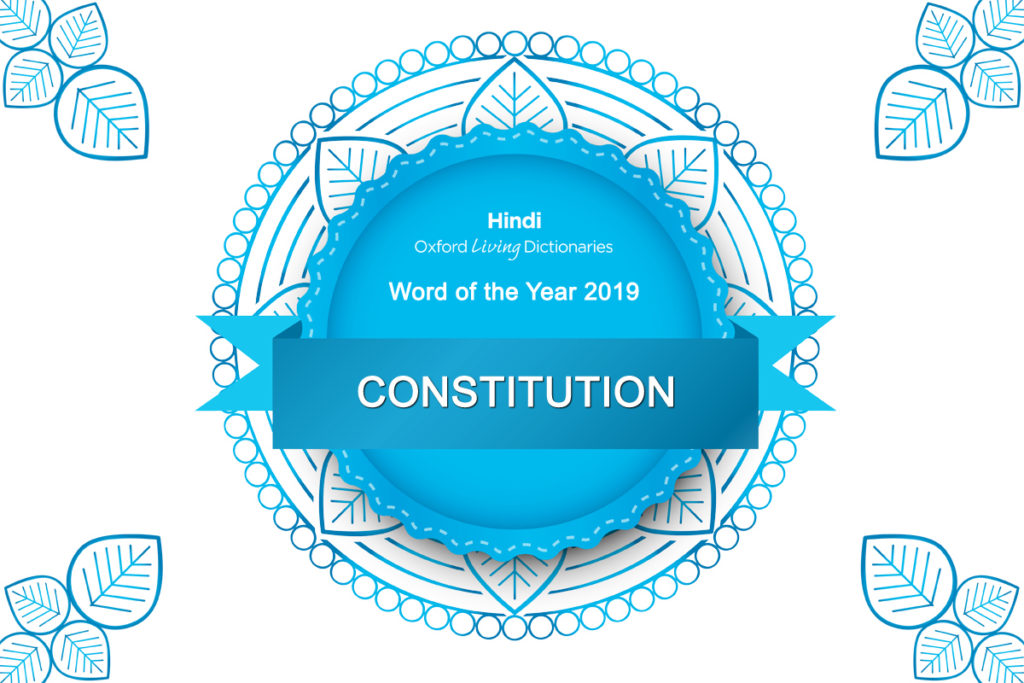Hindi Word of the Year 2019
The Oxford Hindi Word of the Year is a word or expression that is chosen to reflect the ethos, mood, or preoccupations of the passing year, and have lasting potential as a term of cultural significance.
The Oxford Hindi Word of the Year 2019 is… Samvidhaan or the Constitution.

The Constitution comprises the written rules laid down by a nation or institution, on the basis of which that nation or institution can operate smoothly.
The Constitution of any country is a fundamental structure to protect that country’s political system, the judicial system, and the interests of the citizens of that country. The Constitution of India is the highest legislation of India which was passed by the Constituent Assembly on 26 November 1949 and came into effect from 26 January 1950. There have been 104 amendments to the Indian Constitution to date.
In the year 2019, the Indian Constitution gained renewed significance for the common man of India. Before 2019, the relevance of this document drafted by Dr. Bhim Rao Ambedkar was limited to people with specific professional training or background such as lawyers, judges, parliamentarians. Impact of the tenets of the Constitution was felt when in this year, the people of India voted a democratically elected government during the General Elections in the month of May.
In Karnataka, the disqualification of Members of the legislative assembly brought to fore the Constitutional conventions.
In Maharashtra, to save the Constitutional values and to ensure the smooth functioning of democracy, the Supreme Court ordered a floor test.
Next, the impact of the Constitution was felt through the Supreme Court’s judgments on issues with underlying constitutional basis such as the Ayodhya Temple - Babri Mosque dispute.
In the Sabarimala issue, it was remarked by one of the judges that every person should remember that the “Holy Book” is the Constitution of India.
The Government’s decision on abrogation of Article 370 granting special status to Kashmir was another major development that brought the Constitution to the fore. More recently, the country witnessed widespread protests in opposition to a law on citizenship. The debate on the issue aside, it is worthy to note that the protesters (many of whom may have otherwise never had a chance to read the Constitution of India) were studying the document and even reciting portions of it as part of their protest.
One of the bigger states in India, Maharashtra, has issued a circular making recitation of the Preamble of the Constitution mandatory in the schools within the State starting 26th January 2020 (the date the Constitution of India came into effect 70 years ago celebrated as the Republic Day). Reading of the preamble is the part of the “sovereignty of constitution, welfare of all” campaign, the state government circular is understood to have said. The aim of implementing this directive (which was actually a government resolution passed by the previous Government but which was not implemented) is to ensure that the students understand the importance and relevance of the Constitution.
The Preamble of the Constitution states: “We the people of India …… give to ourselves this Constitution.” The year 2019 witnessed the Constitution of India, in a way, truly became a people’s document, given to the people by the people.
The year 2019 witnessed the values of democracy, secularism, justice, liberty, equality and fraternity being tested on the touchstone of the Constitution.
***
To select the Hindi Word of the Year, we obtained entries from Hindi speakers through our Facebook page. In January 2020, when we sought entries for the Hindi Word of the Year from Hindi speakers, we met with a very encouraging response. We received hundreds of diverse and thoughtful entries.
Together with our judging panel of Hindi language experts, we reviewed the entries we had received, analysed them, discussed them, and then took a unanimous decision.
The panelists:
Kritika Agrawal
Kritika Agrawal is an Indian lawyer and a graduate from the University of Oxford. She enjoys a keen interest in languages (especially the lesser spoken ones with a focus on their scripts!), having learnt Tamil, Gujarati and Sanskrit as a student in Sardar Patel Vidyalaya, New Delhi. She also knows Hungarian, Hindi, Urdu, Punjabi, the ancient Brahmi script and English, and has been a recipient of prestigious scholarships for Tamil, Sanskrit and Hungarian.
Sarada Biswas
Sarada Biswas is a Consultant Editor for Hindi in the OGL team. She is also currently a doctoral research fellow in the Department of Linguistics at University of Delhi. Her areas of focus are semantics, pragmatics and the interface of semantics and socio-linguistics. Her research has been on Bangla and Hindi, as well as the varieties of Hindi in Uttar Pradesh.
Naveen Choudhary
Naveen Choudhary is Associate Director Marketing at Oxford University Press. He is an hindi author, satirist and columnist. His novel 'Janta Store' was part of Dainik Jagran - Nielsen bestseller list.
Poonam Sahay
Dr. Poonam Nigam Sahay, born and educated at Delhi (Presentation Convent/Miranda House) is currently an Associate Professor in English Language, Literature & Linguistics at Ranchi University and wears many hats successfully. She is a prolific bilingual poet, writer, editor, critic, and freelancer, writing with an unparalleled passion and zeal in Hindi and English. She works with ELT/Hindi, Modern Drama and Fiction and has presented/published many research papers/poems abroad as well as inland.
Minakshi Singh
Minakshi Singh is a Hindi language editorial consultant for Oxford Languages. She is a student of English Literature, Spanish, Journalism, and Indian Aesthetics, and her interests lie in the field of language documentation and cultural studies. Her vision is to create interesting narratives through and about language in various mediums.
Vivek Tripathi
Vivek Tripathi is Hindi language trainer based in Mumbai. He works part-time as a Hindi Consultant for different organisations and also as a Radio-Jockey for All India Radio, Mumbai. Currently he is the host and producer of his YouTube channel “Exam Hindi”.
